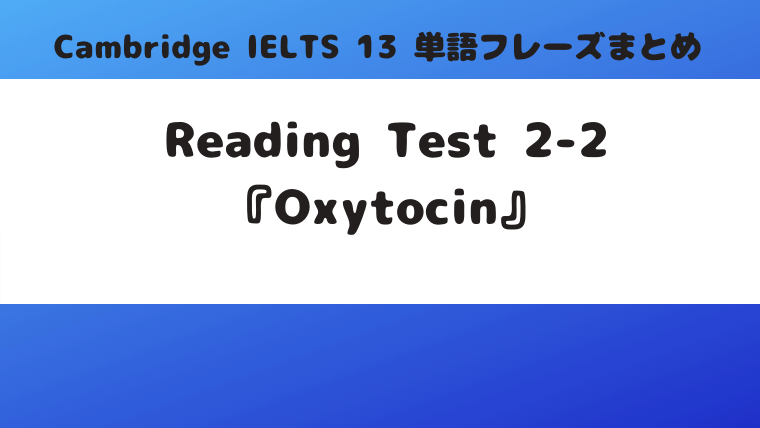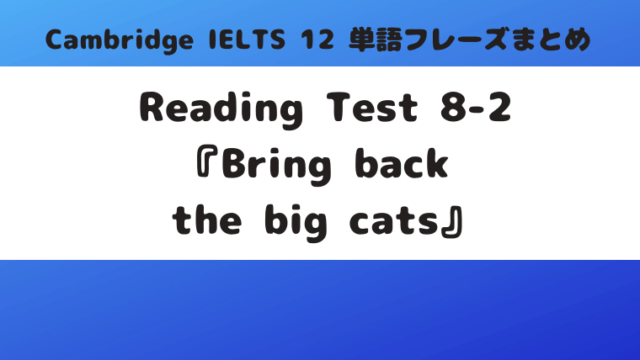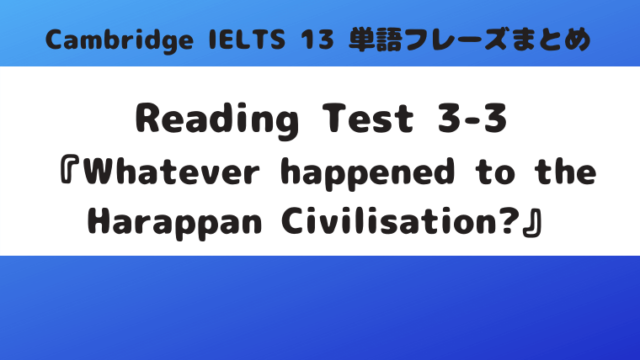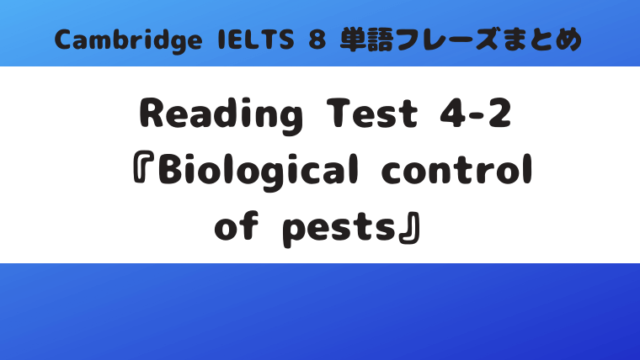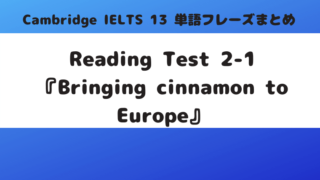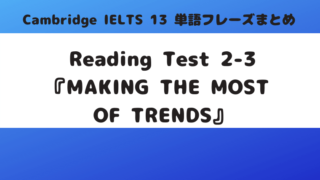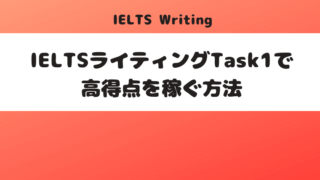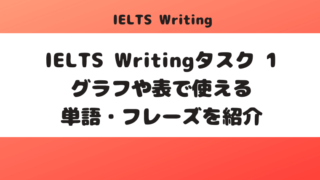「Cambridge IELTS 13」Reading Test2-2『Oxytocin』の単語・フレーズをまとめました。
私がIELTS Readingの単語・まとめを行う理由は「Cambridge IELTS Reading単語・フレーズまとめ」からご覧ください。
Reading Test 2 Passage 2:Oxytocin
- oxytocin
noun [ U ] CHEMISTRY, BIOLOGY
UK /ˌɒk.sɪˈtəʊ.sɪn/ US /ˌɑːk.sɪˈtoʊ-/
a hormone that helps with labour (= the process of pushing out a baby) and helps women and female mammals to produce milk
オキシトコイン - hormone
noun [ C ]
UK /ˈhɔː.məʊn/ US /ˈhɔːr.moʊn/
any of various chemicals made by living cells that influence the development, growth, sex, etc. of an animal and are carried around the body in the blood:
ホルモン
(実践IELTS英単語3500:2685) - pituitary / pituitary gland
noun [ C usually singular ] ANATOMY specialized
UK /pɪˈtʃuː.ɪ.tər.i ˌɡlænd/ US /pɪˈtuː.ə.ter.i ˌɡlænd/
a small organ at the base of the brain that controls the growth and activity of the body by producing hormones
(脳)下垂体 - gland
noun [ C ]
UK /ɡlænd/ US /ɡlænd/
an organ of the body or of a plant that secretes (= produces) liquid chemicals that have various purposes:
腺(せん)
(実践IELTS英単語3500:2808) - reinforce
verb [ T ]
UK /ˌriː.ɪnˈfɔːs/ US /ˌriː.ɪnˈfɔːrs/
・to make something stronger:
・If something reinforces an idea or opinion, it provides more proof or support for it and makes it seem true:
・to provide an army with more soldiers or weapons to make it stronger:
1 <論点・意見など> を補強する, <感情など> をさらに強める
2 <悪い状況など> を助長する
3 <建造物・衣類など> を補強する
4 <軍隊> を増強する
(実践IELTS英単語3500:2109) - prairie
noun [ C or U ]
UK /ˈpreə.ri/ US /ˈprer.i/
a wide area of flat land without trees in Canada and the northern US - motherly
adjective usually approving
UK /ˈmʌð.əl.i/ US /ˈmʌð.ɚ.li/
A motherly woman treats other people with a lot of kindness and love and tries to make certain they are happy.
母親の[らしい], 母性の
(実践IELTS英単語3500:2590) - sniff
verb
UK /snɪf/ US /snɪf/
・to smell something by taking air in through your nose:
・to take air in quickly through your nose, usually to stop the liquid inside the nose from flowing out:
・to speak in an unpleasant way, showing that you have a low opinion of something:
1 《自》 鼻をすする
2 a) 《自》 においをかぐ, <犬などが> 鼻をクンクンさせる
b) 《他》 …のにおいをかぐ
同意 smell
3 《他》 …と鼻であしらう, ばかにする
4 a) 《他》 <麻薬など> を鼻から吸う
b) 《自》 麻薬[シンナー]を鼻から吸う→ snort - revise
verb
UK /rɪˈvaɪz/ US /rɪˈvaɪz/
・to look at or consider again an idea, piece of writing, etc. in order to correct or improve it:
・to study again something you have already learned, in preparation for an exam:
1 《他》 <計画・価格など> を変更する, 修正する
2 《他》 <書いたもの> を訂正[修正]する, 改訂する
3 英 a) 《他》 <学課など> を復習する b) 《自》 復習する
同意 review 米
(実践IELTS英単語3500:1880) - wholly
adverb
UK /ˈhəʊl.li/ US /ˈhoʊl.li/
completely:
〘フォーマル〙 まったく, 完全に - groundbreaking
adjective
UK /ˈɡraʊndˌbreɪ.kɪŋ/ US /ˈɡraʊndˌbreɪ.kɪŋ/
If something is groundbreaking, it is very new and a big change from other things of its type:
(科学・芸術などが) 草分け的な, 革新的な - nasal
adjective
UK /ˈneɪ.zəl/ US /ˈneɪ.zəl/
related to the nose:
1 鼻の
2 <声・音などが> 鼻にかかった
3 〘専門〙 (音声学で) 鼻音の - placebo
noun [ C ]
UK /pləˈsiː.bəʊ/ US /pləˈsiː.boʊ/
・a substance given to someone who is told that it is a particular medicine, either to make that person feel as if they are getting better or to compare the effect of the particular medicine when given to others:
・something that is given to try to satisfy a person who has not been given the thing they really want:
1 (新薬テストなどの) 偽薬, プラシーボ
2 気休め
(実践IELTS英単語3500:2722) - lonesome
adjective US
UK /ˈləʊn.səm/ US /ˈloʊn.səm/
→ lonely
by/on your lonesome
alone:
1 (話し相手がいなくて) 寂しい, 孤独な 同意 lonely→ alone
2 <歌・雰囲気などが> 人を寂しくさせる, 寂しげな
同意 lonely
3 人里離れた 同意 lonely - constructively
adjective
UK /kənˈstrʌk.tɪv/ US /kənˈstrʌk.tɪv/
If advice, criticism, or actions are constructive, they are useful and intended to help or improve something:
建設的な - fuel
noun
UK /ˈfjuː.əl/ US /ˈfjuː.əl/
・a substance that is used to provide heat or power, usually by being burned:
・anything that keeps people’s ideas or feelings active, or makes them stronger:
1 《C, U》 燃料
2 《U》 (議論などを) たきつけるもの - inhale
verb
UK /ɪnˈheɪl/ US /ɪnˈheɪl/
to breathe air, smoke, or gas into your lungs:
a) 《他》 <空気・煙・ガス> を吸い込む, 吸入する b) 《自》 吸い込む 反意 exhale
(実践IELTS英単語3500:3270) - administer
verb
UK /ədˈmɪn.ɪ.stər/ US /ədˈmɪn.ə.stɚ/
・to control the operation or arrangement of something:
・to govern a country, region, etc.:
1 《他》 …を管理する, 運営する, 統治する
2 a) 《他》 administer something to somebody
<…>を<人>に施す, 実施する
b) 《自》 administer to somebody’s needs
<人>の要求に応じる
3 《他》 〘フォーマル〙 <薬など> を投与する, 塗布する
administer something to somebody
<人>に<…>を投与[供給]する
(実践IELTS英単語3500:2217) - disposition
noun
UK /ˌdɪs.pəˈzɪʃ.ən/ US /ˌdɪs.pəˈzɪʃ.ən/
・the particular type of character that a person naturally has:
・a natural tendency to do something, or to have or develop something:
1 《C通例単数形で》 (人の) 気質, 性格, 性分
2 《常に単数形で》 (行動の) 傾向
3 《U》 〘フォーマル〙 (資産などの) 売却, 処分, 譲渡
同意 disposal
4 《U》 〘フォーマル〙 (問題などの) 処理, 扱い方
5 《C通例単数形で》 〘フォーマル〙 配置, 配列, 配備 - vary
verb [ I or T ]
UK /ˈveə.ri/ US /ˈver.i/
・If things of the same type vary, they are different from each other, and if you vary them, you cause them to be different from each other:
・to change or cause something to change in amount or level, especially from one occasion to another:
1 《自》 (同類の物の間で) さまざまである, 異なる
• Estimates of the size of the population vary.
人口規模の推定値がまちまちだ.
vary considerably / greatly / widely
非常にさまざまである
• The content of the courses varies widely.
講座の内容は非常にさまざまだ.
vary according to something / depending on something
<…>によって異なる
• Ticket prices to New York vary, depending on the time of year.
ニューヨーク行きのチケットの値段は時期によって異なる.
vary from something to something
1 <…>によって異なる
2 《他》 …に変化をつける
(実践IELTS英単語3500:409) - favouritism
noun [ U ] UK disapproving (US favoritism)
UK /ˈfeɪ.vər.ɪ.tɪ.zəm/ US /ˈfeɪ.vər.ə.tɪ.zəm/
unfair support shown to one person or group, especially by someone in authority:
えこひいき, 偏愛 - goodwill
noun
UK /ɡʊdˈwɪl/ US /ɡʊdˈwɪl/
・friendly and helpful feelings:
・part of a company’s value that includes things that cannot be directly measured, for example, its good reputation or its customers’ loyalty:
1 善意, 親善
2 (商売上の) 信頼, (企業と顧客の) 信頼関係 - nuanced
adjective
UK /ˈnjuː.ɑːnst/ US /ˈnuː.ɑːnst/
made slightly different in appearance, meaning, sound, etc.:
(表現・意味・色彩などの) 微妙な違い, ニュアンス - propel
verb [ T ]
UK /prəˈpel/ US /prəˈpel/
・to push or move something somewhere, often with a lot of force:
・to cause someone to do an activity or be in a situation:
1 …を推進する, 前進させる
→ propulsion
2 《always + adverb/preposition》 〘書き言葉〙 (ある方向に) <人> を(押し[突き])動かす
3 <人> を駆り立てる, 促す
(実践IELTS英単語3500:2475) - pinpoint
verb [ T ]
UK /ˈpɪn.pɔɪnt/ US /ˈpɪn.pɔɪnt/
・to find out or say the exact position in space or time of something:
・to discover or describe the exact facts about something:
1 <問題・原因など> を特定する, 突き止める
2 <位置> を特定する
3 <時> を特定する - seek sb/sth out
— phrasal verb with seek verb formal
UK /siːk/ US /siːk/
to look for someone or something, especially for a long time until you find him, her, or it:
<…>を探し出す - spotlight
noun [ C ]
UK /ˈspɒt.laɪt/ US /ˈspɑːt.laɪt/
a lamp whose beam can be directed, or a circle of light produced by such a lamp
1 the spotlight (新聞・テレビなどでの) 脚光, スポットライト
2 《C》 (野外・舞台などの) スポットライト
3 《常に単数形で》 スポットライト(の光) - shine in / on something
<光が> <…>に強く当たる, まぶしい - posture
noun
UK /ˈpɒs.tʃər/ US /ˈpɑːs.tʃɚ/
・the way in which someone usually holds their shoulders, neck, and back, or a particular position in which someone stands, sits, etc.:
・a way in which a government or other organization thinks about and/or deals with a particular matter:
1 《C, U》 姿勢
2 《C通例単数形で》 態度, (精神的な) 姿勢
(実践IELTS英単語3500:2225) - flicker
verb
UK /ˈflɪk.ər/ US /ˈflɪk.ɚ/
・to shine with a light that is sometimes bright and sometimes weak:
I felt a cold draft and the candle started to flicker.
・to appear for a short time or to make a sudden movement:
1 <炎・光などが> 揺らめく, 明滅する, ちらちらする
2 《always+ adverb/preposition》 〘書き言葉〙 <感情・表情などが> (顔・目に) ちらっと浮かぶ, <考え・思い出などが> (頭を) よぎる
3 ぴくっと動く, 小刻みに動く - attuned
adjective [ after verb ]
・able to understand or recognize something:
・able to understand or recognize a particular sound:
attuned to something
1 <考え・行動など>を敏感に察知できる
2 <危険>を敏感に察知できる, <音など>を容易に感知できる - prone
be prone to sth/do sth
likely to suffer from an illness or show a particular negative characteristic:
1 prone to something
<望ましくないことなど>をしがちな, しやすい, になりやすい
2 〘フォーマル〙 うつぶせになった
(実践IELTS英単語3500:2568) - interpret
verb
UK /ɪnˈtɜː.prɪt/ US /-ˈtɝː-/
・to decide what the intended meaning of something is:
・to express your own ideas about the intended meaning of a play or a piece of music when performing it:
・to change what someone is saying into another language:
1 a) 《自》 通訳する
b) 《他》 <言葉> を通訳する→ translate
2 《他》 <人の行動・出来事など> を解釈する
3 《他》 <夢・物語など> を解釈する
4 《他》 <劇・音楽など> を独自の解釈に基づいて演じる[演奏する]
(実践IELTS英単語3500:1170) - perplexing
adjective
UK /pəˈplek.sɪŋ/ US /pɚˈplek.sɪŋ/
confusing, often because you do not know how to solve something:
困惑させる(ような), 理解に苦しむ
同意 puzzling
(実践IELTS英単語3500:2499) - molecule
noun [ C ]
UK /ˈmɒl.ɪ.kjuːl/ US /ˈmɑː.lɪ.kjuːl/
the simplest unit of a chemical substance, usually a group of two or more atoms
分子 - co-opt
verb [ T ]
UK /kəʊˈɒpt/ US /koʊˈɑːpt/
・(of an elected group) to make someone a member through the choice of the present members:
・to include someone in something, often against their will:
・to use someone else’s ideas:
1 米 〘けなして〙 <他人の成果・考えなど> を横取りする, 利用する
2 <人> を手伝わせる
3 英 <新会員など> を選任する - primitive
adjective
UK /ˈprɪm.ɪ.tɪv/ US /ˈprɪm.ə.t̬ɪv/
・relating to human society at a very early stage of development, with people living in a simple way without machines or a writing system:
・Primitive living conditions are basic, unpleasant, and uncomfortable:
1 未開の
2 原始(時代)の, 最初期の
3 <設備・状況などが> 原始的な, 旧式の
4 <感情・欲求などが> 根源的な
(実践IELTS英単語3500:1481) - amygdala
noun [ C ] ANATOMY specialized
UK /əˈmɪɡ.də.lə/ US /əˈmɪɡ.də.lə/
one of two parts of the brain that affect how people feel emotions, especially fear and pleasure
扁桃体は、ヒトを含む高等脊椎動物の側頭葉内側の奥に存在する、アーモンド形の神経細胞の集まり。 - manifest
verb [ T ] formal
UK /ˈmæn.ɪ.fest/ US /ˈmæn.ə.fest/
to show something clearly, through signs or actions:
1 <感情・態度など> を表明する
2 manifest itself
<問題・症状などが> 現れる, 目に見えてくる
